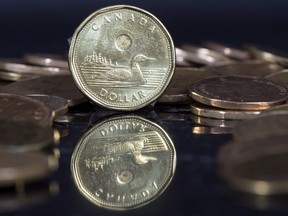As domestic politics takes a backseat, the Canadian dollar appears to be recovering from its initial shock caused by Prime Minister Justin Trudeau’s resignation. The impact of his decision on the currency is slowly wearing off, as economists and experts weigh in on the broader issues that will continue to influence the exchange rate.
A Glimpse into the Recent Market Performance
On Monday, the Canadian dollar rose 0.79 per cent from its Friday close, briefly surpassing the 70-cent-U.S. mark that it had dropped below on December 16, the day Chrystia Freeland announced her resignation as finance minister.
A Closer Look at the Currency Experts’ Views
Karl Schamotta, chief market strategist at Corpay Currency Research, noted that the loonie’s performance on Monday compared to other major currencies suggests that traders are not placing much significance on short-term domestic political developments. Gains by the Canadian dollar left it stuck in the middle of a pack of other currencies, including the Mexican peso, the Australian dollar, the pound, and the euro.
"This tells us that traders don’t see short-term domestic political developments changing the longer-term economic calculus that has kept the exchange rate under pressure," Schamotta said. "Trudeau wasn’t the only news the currency had to contend with."
Mixed Signals from Trump’s Administration
A few hours after the Washington Post article suggesting a slower pace of tariff implementation, Trump rebutted the piece on his Truth Social platform. Given that the peso and the loonie moved in a relatively narrow range on the news, Schamotta thinks such currencies still face significant downside risks.
"We expect continued volatility in USD/CAD off headline risks," said the CIBC Fixed Income Currency and Commodity experts in a fresh note on Tuesday. "We see the tariff premium in USD/CAD building through Q1 as Trump ramps up tariff rhetoric, at the same time as Canada ramps up for a federal election."
Rate Cuts and the Canadian Dollar
David Rosenberg, founder of Rosenberg Research and Associates Inc., also weighed in on the potential for rate cuts from the Bank of Canada. Contracting data released Monday confirmed for him that more interest rate cuts are coming to counteract a slowing economy.
"The S&P Global Composite Purchasing Managers’ Index for December fell below 50, indicating the sentiment among managers at manufacturing, construction, and services firms is slumping," Rosenberg said. "This serves as a reminder that the (Bank of Canada) has more work to do even as the (Federal Reserve) moves to the sidelines (at least for now)."
More rate cuts from the Bank of Canada will result in the Canadian dollar falling further against its American counterpart, as investors chase the higher returns from the greenback.
The Future Outlook
As the market continues to digest the latest news and developments, it is clear that the impact of Justin Trudeau’s resignation on the Canadian dollar is slowly fading. With a potential federal election on the horizon, continued volatility in USD/CAD is expected off headline risks. The tariff premium in USD/CAD is likely to build through Q1 as Trump ramps up tariff rhetoric.
However, with more rate cuts on the horizon from the Bank of Canada, investors should be prepared for the Canadian dollar to fall further against its American counterpart. As David Rosenberg noted, "The worst of times may lie ahead for markets."
Join the Discussion
What are your thoughts on the impact of Justin Trudeau’s resignation on the Canadian dollar? Share your opinions and insights in the comments below.
Bookmark Our Website and Support Our Journalism
To stay up-to-date with the latest business news, add financialpost.com to your bookmarks and sign up for our newsletters here.




